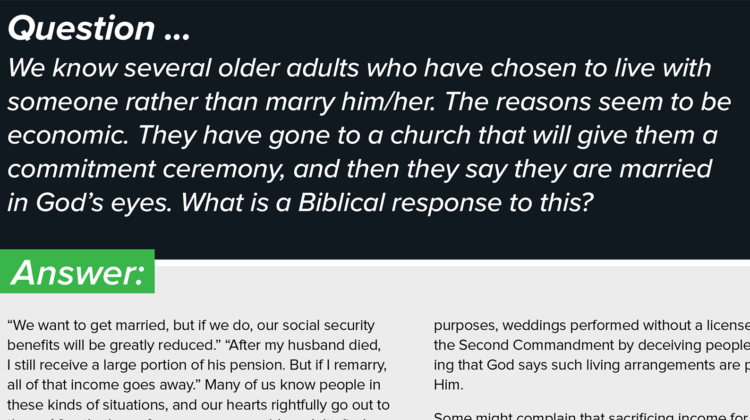
Question: We know several older adults who have chosen to live with someone rather than marry him/her. The reasons seem to be economic. They have gone to a church that will give them a commitment ceremony, and then they say they are married in God’s eyes. What is a Biblical response to this?
Answer: “We want to get married, but if we do, our social security benefits will be greatly reduced.” “After my husband died, I still receive a large portion of his pension. But if I remarry, all of that income goes away.” Many of us know people in these kinds of situations, and our hearts rightfully go out to them. After the loss of a spouse, many older adults find an answer to their need for companionship in meeting someone new. Yet government benefits and employer pensions often incentivize surviving spouses away from remarriage by reducing their income if they choose to remarry. As a result, some older adults argue that they have no alternative but to live together out of wedlock if they want to be together. “After all,” they say, “a marriage is just a piece of paper.”
Yet Scripture speaks clearly when it comes to God’s expectations for marriage and for the believer’s relationship with his or her employer and with the state. If a man and a woman choose to live together out of wedlock, they are not following God’s will with regard to marriage. According to Scripture, a marriage is more than “just a piece of paper.” A man shall “leave his father and mother” and be “joined to his wife” (Genesis 2:24). Marriage involves the public declaration of a lifelong commitment and promise of faithfulness between husband and wife. That declaration and promise are missing in any cohabitation arrangement, even among senior citizens.
The Fourth and Seventh Commandments also apply. What happens when a couple avoids being married (or gets married) for the sake of a pension or a government benefit? At that point, people are then taking money or services that do not rightfully belong to them, either from an employer or from the government. There’s another word for it: stealing.
For these reasons, it is especially troubling to hear that churches are offering people in this situation a “commitment ceremony.” This is nothing more than an effort to put religious “lipstick” on the “pig” of sinful disobedience. Such “commitment ceremonies” sound like, for all intents and purposes, weddings performed without a license, and violate the Second Commandment by deceiving people into believing that God says such living arrangements are pleasing to Him.
Some might complain that sacrificing income for marriage is too great a sacrifice to make. Yet did Jesus not say, “Whoever does not bear his cross after Me cannot be My disciple” (Luke 14:27)? Faithfulness is the cost of being a follower of Christ. Faith involves sacrifice, making hard choices while trusting in the Lord’s promises to provide what we need and work all things out for our good. Even Jesus told His followers to “count the cost” of their discipleship. A faithful believer will want to think through his or her situation in life carefully prior to entering the world of dating. For older adults, part of that consideration includes the impact a marriage can have on one’s finances.
The couple who fears marriage because of a potential loss of income needs to hear the assurance of St. Paul: “He who did not spare His own Son, but delivered Him up for us all, how shall He not with Him also freely give us all things?” (Romans 8:32). Even though we human beings may have a hard time seeing how He can do it, our almighty and gracious Lord promises that He will provide for all of our needs. “Therefore do not worry, saying, ‘What shall we eat?’ or ‘What shall we drink?’ or ‘What shall we wear?’… For your heavenly Father knows that you need all these things. But seek first the kingdom of God and His righteousness, and all these things shall be added to you” (Matthew 6:31-33).
Pastor Piet Van Kampen